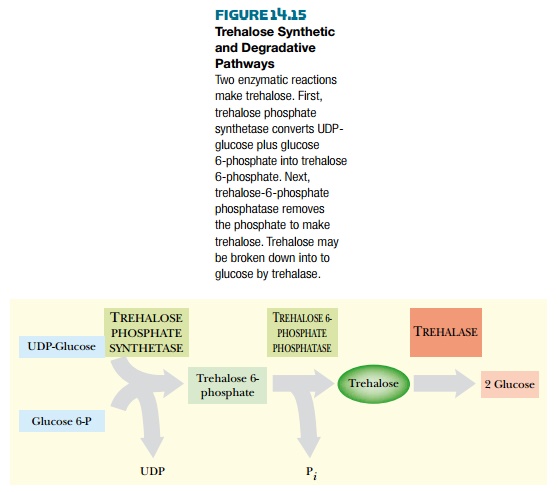Chapter: Biotechnology Applying the Genetic Revolution: Transgenic Plants and Plant Biotechnology
Trehalose in Transgenic Plants Increase Stress Tolerance
TREHALOSE
IN TRANSGENIC PLANTS INCREASE STRESS TOLERANCE
Plants are highly adaptable
and have many mechanisms to survive environmental stresses. Drought and high
salinity of irrigation water are two stresses that pose problems in growing
crop plants. In drought-tolerant plants, fungi, and bacteria, the sugar
trehalose protects the organism during times of stress. Trehalose is a nonreducing storage carbohydrate that has the
capacity to absorb or release water molecules. Two enzymes make trehalose: Trehalose phosphate synthase converts
UDP-glucose and glucose 6-phosphate to trehalose 6- phosphate. Next, trehalose
6-phosphate phosphatase removes the phosphate to make trehalose (Fig. 14.15).

Another enzyme, trehalase,
degrades the trehalose molecule into two glucose molecules.
To make rice more tolerant to
high salinity or drought, a fusion gene encoding a protein with both trehalose
phosphate synthase and trehalose 6-phosphate phosphatase activities was created
and transformed into rice using the Ti plasmid of Agrobacterium. Two different constructs were tested that had the
same fusion gene but different promoters. One construct had a stress-inducible
promoter, and the other a light-inducible promoter. The insertion of these
genes into rice made it much more tolerant to high salt concentrations and also
to the lack of water. However, the same fusion gene with a constitutive
promoter stunted plant growth. Thus, the expression pattern of transgenes can
greatly change the outcome. These transgenic rice plants have not yet been used
in the field, but show promise in finding ways to increase food production and
quality in changing environments.
Related Topics